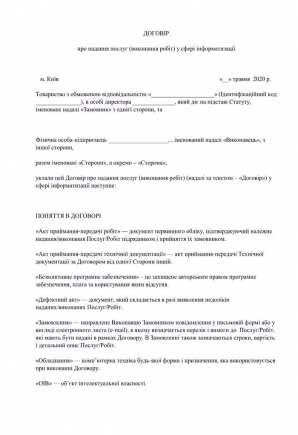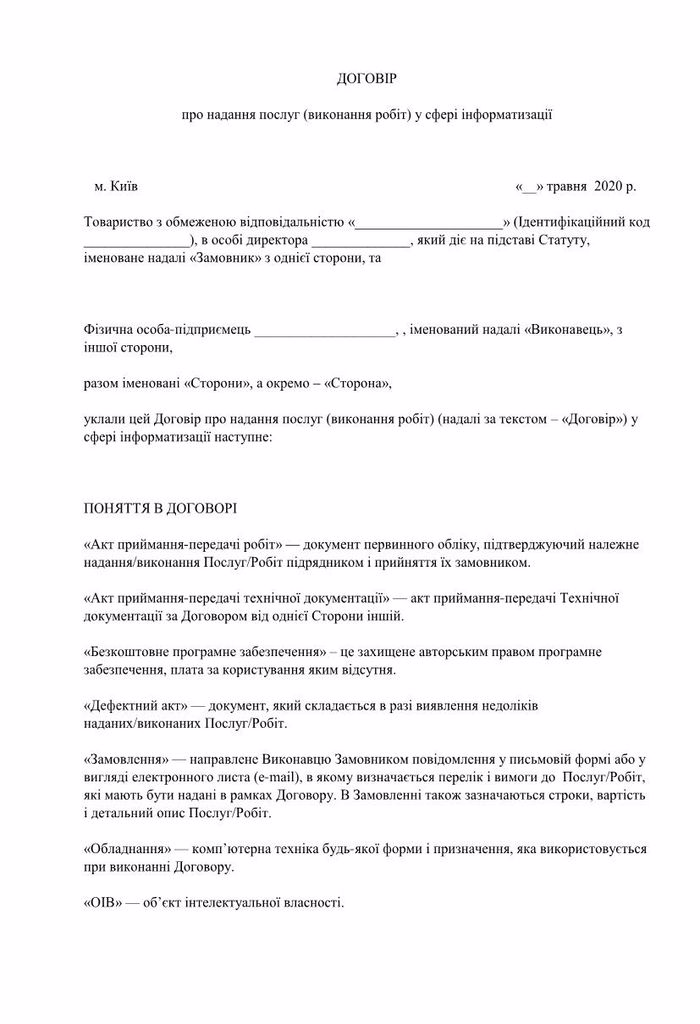Organization and accounting of IT companies in Ukraine
Cost of services:
Reviews of our Clients
... our work on joint projects assured us of your high level of professionalism
The provision of IT services and goods is considered by regulatory authorities and banks as risky operation. Close attention of supervisory authorities to the IT sector obliges companies to pay close attention to accounting issues.
Proper maintenance of accounting records for IT companies allows the owner to:
- manage income and profits;
- minimize tax risks;
- reduce the risk of being caught by banks' financial monitoring;
- have a financial history of their business in order to further analyze the activity or to enter foreign markets/attract investors.
Today, our experts will reveal the specific features of the accounting process in the IT sector in Ukraine.
You may also like: Taxation of Diia City Residents: What Taxes Will IT Companies Pay in Ukraine?
What is an accounting policy, and how does it work in IT?
The organization and structure of the accounting of each company are based on the general principles of financial and tax accounting. Depending on the specifics and type of the company's activity, the general accounting rules are adjusted to the business strategy. They must be prescribed and approved by the accounting policy of the company, the main document, which describes all the rules and peculiarities of accounting, directly for your company.
Please note that tax accounting is made on the basis of accounting data, so if your accounting policy is detailed in the rules of accounting processes of the company, the tax authorities will not be able to impose unjustified penalties.
For example, your company's accounting policy states that each project may involve no more than 40% of the sole proprietors. In this case, you reduce the risk of recognition of labor relations between your company and sole proprietors.
When we talk about adapting accounting rules to business strategies, we consider (but are not limited to) the following factors:
- what goods/services the company will provide;
- who will be the customers and contractors;
- what staff will be employed by the company (in-house/outsourced);
- what business plans the owner has (financial model and business plan data);
- other data related to the operation of the company.
All of the above factors form the main models of the company. Choosing the right model is the key to successful business operation and tax optimization.
You may also like: Indexation of IT Companies Wages in Ukraine
Main models of IT-companies and features of their taxation
Business model 1. Customer (non-resident) - developer (resident natural person)
According to this model, a foreign customer executes cooperation directly with different developers (who are registered as sole proprietors).
Advantages:
- no employment relationship;
- the intellectual property belongs to a foreign customer.
Disadvantages:
- currency transactions are subject to financial monitoring;
- the provision of services must be formalized in accordance with the legislative norms;
- there may be difficulties in resolving disputes;
- the foreign customer communicates directly with all developers.
Taxes:
The earnings of a developer who is a sole proprietor are taxed according to its taxation scheme. Often this is:
- single tax in the amount of 5% of the funds received on the account,
and
- unified social tax в in an amount not less than the minimum (as of 01.10.2022) of UAH 1,474.00.
Note: For the period of martial law sole proprietors are exempt from mandatory payment of unified social tax to the budget with the simultaneous suspension of employment history.
Business model 2. Customer (non-resident) - LLC (resident) - developer (resident natural person)
This model supposes an alternative to permanent foreign representative office and represents the cooperation of a foreign customer with LLC that manages the business of foreign company on the territory of Ukraine.
LLC hires key employees (director, administrator, project manager, etc.) and concludes contracts with developers (registered as sole proprietors).
Advantages:
- a foreign customer works with only 1 company and does not need to negotiate and conclude contracts with hundreds of sole proprietors;
- a foreign customer owns intellectual property.
Disadvantages:
- risk of recognition of labor relations between LLC and sole proprietors, if they work in the same room/office/co-working room;
- increased expenses for accounting services for LLC.
Taxes:
- 5% of the income earned by sole proprietors and UAH 1474 of unified social tax (as of 01.10.2022)
- 5% of single tax from income received or 18% of income tax from the financial result of LLC.
Business model 3. Customer (non-resident) - LLC with hired employees (resident).
Traditional co-working model - LLC hires full-time developers who perform work on the order of a foreign client. This model is the safest (from the tax point of view) and also the most taxable.
Advantages:
- intellectual property belongs to a foreign customer;
- high investment attractiveness of LLC;
- provision of official workplaces;
- possibility to employ foreigners;
- minimal concern of the controlling authorities.
Disadvantages:
- high payroll taxes (19.5% withheld from employees' salaries and 22% paid by the employer);
- increased expenses on accounting services for LLC.
Taxes:
- withholding from employees' salaries - 18% personal income tax and 1.5% military tax.
- wage pool accruals - 22%
- 18% income tax on the financial result of LLC.
Business model 4. Customer (non-resident)- Diia City resident.
In this paragraph we suggest an analog of Model 2 and 3, but with the difference that an LLC (or a sole proprietor) follows the rules of the legal regime of Diia City.
Read more about this legal regime here.
Each of the above models may be implemented as described in this article, or as a combination of several more favorable taxation models.
If you want to avoid unnecessary questions from the controlling bodies and save time for the development of your company, we recommend you use outsourced accounting services. Our specialists will help you to make a preliminary financial model of your business and choose the optimal business model in terms of taxation and cooperation.
You may also like: Software Rights for an IT Startup in Ukraine.
Checklist of the most common mistakes made by IT business owners
The most common mistakes include:
- Absence or inconsistency of the actual place of business of LLC (no own premises or no lease agreements) - the risk of recognition of fictitious operations of the company - a fine from UAH 510 to shutdown of entrepreneurial activity by the state registrar (on the basis of a tax authorities' notification).
- Non-compliance of the declared type of economic activities to actually rendered services - violation of conditions of the single taxpayer, which entails taxation of 18% profit tax.
- Lack of fixed assets or other assets to perform the work of the customers - the risk of recognizing operations as fictitious.
- Use of unlicensed software - the risk of copyright infringement.
- Neglecting to protect own intellectual rights - the risk of theft and loss of own developments.
- Neglecting the maintenance of accounting records - the risk of penalties of UAH 300 or more and gaining a loss prematurely instead of expected profit.
- Template execution of primary documents between LLC and sole proprietors - the recognition of the employment relationship, the penalty for the admission of an employee without an employment agreement - UAH 201 thousand.
Of course, such consequences can easily be avoided by properly structuring your company's accounting processes. Large companies always have the option of automating or robotizing their accounting processes.
We will help you decide on the best option for your business in the current environment - through Diia City residency or other legal regimes. Our lawyers help you optimize your taxes and solve employment issues.
We are your reliable partner in any legal matters.
Our clients






